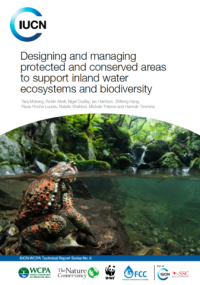
Designing and managing protected and conserved areas to support inland water ecosystems and biodiversity
Inland waters – such as rivers, lakes and other wetlands – are among the most biodiverse ecosystems on the planet. They are also the most threatened; almost one in three species is at risk of extinction and monitored populations of freshwater species have declined by 85% since 1970. The loss of these ecosystems has cascading effects on human livelihoods, cultures and our overall well-being. While protected and conserved areas can play an important role in bending the curve of inland water biodiversity and ecosystem loss, they have rarely been designed, designated, and managed for that purpose. Motivated by the Kunming-Montreal Global Biodiversity Framework’s inclusion of inland waters in the target to conserve 30% of the planet by 2030, this report provides guidance in employing protected areas and other effective area-based conservation measures to benefit these ecosystems and the biodiversity they support. Through a series of case studies and synthesized research, it highlights how integrating the unique needs of inland waters into area-based strategies can improve conservation effectiveness across all realms, build climate resilience and sustain critical ecosystem services.

